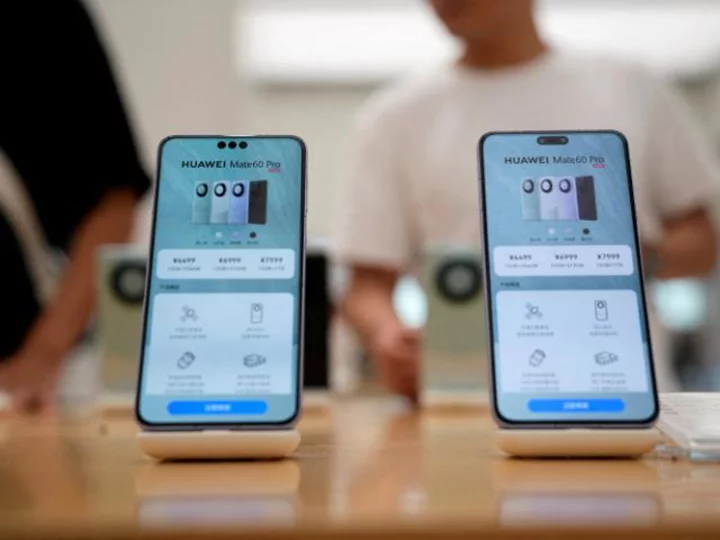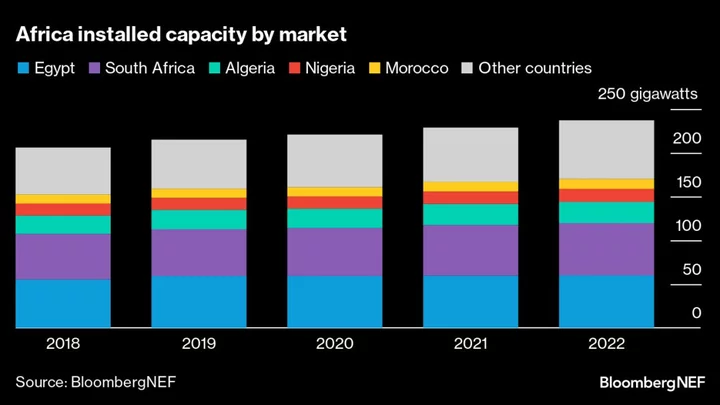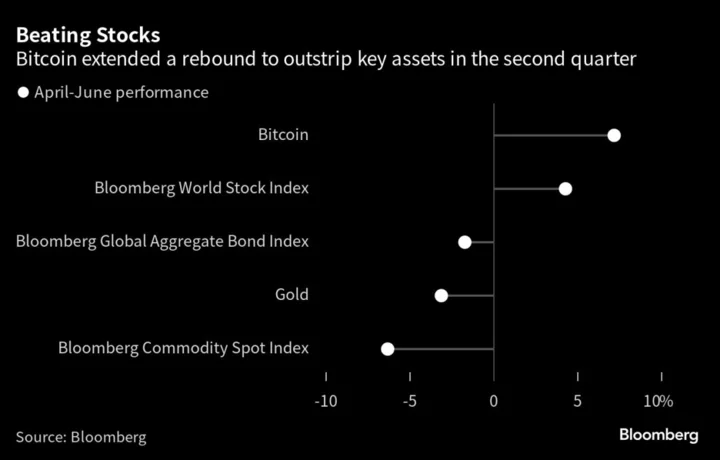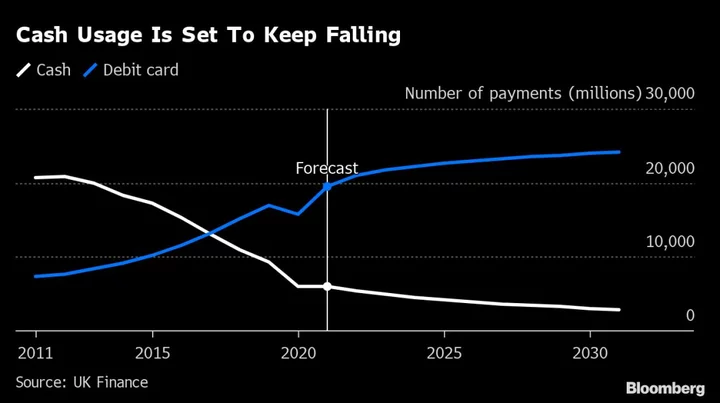Stock prices of chipmakers have soared over the last year as AI became the story of 2023. But in recent weeks, there's been a notable drop in those shares as growing tensions between the US and China cloud their outlook.
Last week, Chinese manufacturer Huawei revealed its controversial new Mate 60 Pro phone. That led to investigations in the US into how the company managed to launch the phone after spending the past four years under US restrictions that aimed to restrict its access to 5G technology. Huawei's feat could mean that Chinese technology has been progressing much faster than previously thought.
The development prompted two US congressmen, Mike Gallagher and Michael McCaul, to call on the White House to further restrict technology exports to Chinese companies.
Angelo Zino, senior semiconductor analyst at CFRA, says he sees a greater than 50% probability that the US will implement more chip restrictions in China. That's bad news for US companies exposed to the smartphone ecosystem like Qorvo (QRVO) and Skyworks Solutions (SWKS), he said.
Before the Bell spoke to Zino about what's happening and what it means for Wall Street.
This interview has been edited for length and Clarity.
Before the Bell: Can you give us the lay of the land? What's happening with chipmaking in China?
Angelo Zino: There's been a big back and forth between the US and China in the race to AI. There's been fear about the Chinese government potentially getting hold of chips and their capabilities from a number of US-based chipmakers.
When you think about where most of the semiconductors in the world are currently produced, they're mostly out in Taiwan and Korea, and China has been attempting to ramp up their production over the past couple of years.
About a third of the world's electronic devices are already assembled in China at companies like Foxconn, and now they're increasing their capacity to make the chips as well, and they've been very successful. They've ordered a significant amount of equipment from the United States made by the likes of Applied Materials, among others, to increase their capacity and exposure in the semiconductor industry, and now they're developing some very high tech chips out there despite some of the bans and tariffs that have been imposed by the US administration over the last couple years.
So why is the US investigating Huawei's new smartphone?
Huawei's new smartphone uses an internally developed, very powerful chip that's manufactured by the Semiconductor Manufacturing International Corporation (SMIC), a partially state-owned Chinese semiconductor foundry. That means that SMIC is now believed to have the tools to develop very advanced 5G chips for phones, and that's concerning to US government officials because they want to keep a big lead in developing advanced technology. This chip is still inferior to what's in new iPhones, but it's still concerning.
US officials want to know if Huawei created this device in a fair manner. Were they able to actually create this device without utilizing any banned components? There's limited information about what exactly is in this device, but when you look at the capabilities that it has, it makes you wonder. Even if this was all done in a fair manner by Huawei, utilizing only components developed in China, that also raises flags because that means Chinese technology has been progressing much faster than we thought. That means the US government could further increase the chip restrictions for Huawei and SMIC.
So what does this mean for US investors?
In the long term, this is probably a good thing for the leading semiconductor companies like Nvidia (NVDA) and Qualcomm (QCOM). These are the most advanced companies out there that are driving innovation. It will help them if the US government puts some limitations on China to slow the pace of innovation in their local manufacturing industry, it gives these companies more of an advantage. But it becomes extremely difficult to say what the implication of this will be over the next six months. In that case it's probably more negative in the short term.
So how do investors reconcile being told that chip stocks are the future and that geopolitical tensions could put a damper on the industry?
What we tell people is focus on the circular drivers and not necessarily the day-to-day kind of moves and some of the geopolitical tensions that are out there. Look, those tensions will probably impact the viability of some of these companies, there are always going to be risks associated with investing in an individual company. But the secular opportunities attached to the semiconductor industry, especially with AI becoming the biggest game in town, will be absolutely enormous over the next decade. You want to invest in semiconductor stocks that are tied to those secular themes. I don't think you can buy semiconductors blindly. You have to do your homework.
You have a particular interest in Intel (INTC). Why?
Intel has really shifted their business model to focus on becoming a foundry partner for every chipmaker in the world, with an emphasis on diversifying away from Asia because of the rising geopolitical tension there. They've worked very closely with the US government on this, and we do think there's going to be high demand for their chips in the coming years because companies will need to work outside of China. Intel is viewed as an answer to a lot of these geopolitical issues that are stirring right now in the semiconductor industry. And the hope is by 2025 or 2026 they've got enough capacity out there to really help the industry in a big way.
The US dollar is king again. Here's why
The US dollar is enjoying its longest winning streak in nearly nine years, reports my colleague Anna Cooban.
The greenback chalked up its eighth-straight week of gains against a basket of other major currencies on Friday, its best run since winter 2014-2015. It has gained 5% since mid-July.
The rally comes after months of volatility, fueled by concerns that the dollar may be losing its status as the world's reserve currency. Speculation about the potential de-dollarization of global trade rose again last month after the Chinese-led expansion of the BRICS group of nations to include major oil producers, such as Saudi Arabia.
The US Dollar Index, which now stands at its highest level in six months, has been buoyed by a slew of positive economic data from the United States in recent weeks — fueling expectations that the Federal Reserve will keep interest rates higher for longer. Higher interest rates tend to boost the value of a country's currency by attracting more foreign capital, as investors anticipate making bigger returns.
Meanwhile, storm clouds have gathered over the economies of China and Europe.
The euro has lost 4.4% of its value to trade at $1.07 since mid-July. The Chinese yuan has slumped by 2.6% in that time to hit its lowest level against the dollar in 16 years.
Furniture companies are in a rut
People aren't buying furniture like they used to, reports my colleague Samantha Delouya.
Last week, a pair of furniture retailers said they are experiencing a massive sales slump compared to last year. On Thursday, luxury furniture brand RH reported a 19% drop in second-quarter revenue, while on Friday, Hooker Furnishings, a Virginia-based furniture manufacturer that sells goods at Wayfair, Macy's and other retailers, said their second-quarter revenue plummeted 36%.
Investors appear to be worried. On Friday, shares of RH (RH) fell 16%, while Hooker Furnishings (HOFT) dropped 17%.
The two companies are the latest in a growing list of furniture retailers seeing a slowdown after years of growth fueled by pandemic-era stay-at-home trends.
Last month, Williams-Sonoma, which owns West Elm and Pottery Barn, reported a 20% revenue decline for West Elm and a 10% decline for Pottery Barn. Wayfair, an online furniture seller, saw its second-quarter revenue decline 3.4%, and La-Z-Boy, a furniture manufacturer, reported a 20% drop in sales in August.
"We're in a period where consumers are buying fewer large-ticket furniture pieces than they did a year ago as they shift their spending," Williams-Sonoma CEO Laura Alber said on a call with investors.









